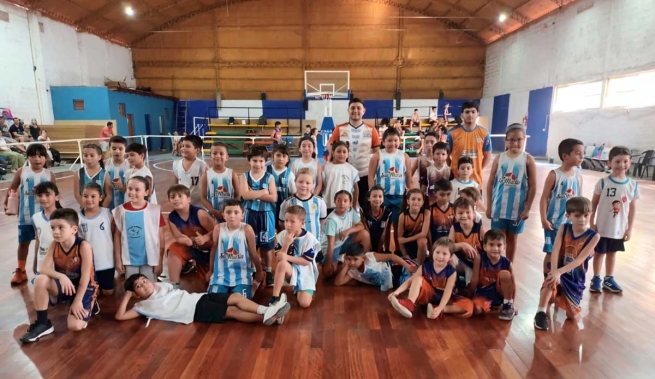The club's history began nine years ago, when a group of physical education teachers from the Salesian Pius XI school in Corrientes decided to open an inclusive sports space for the youngest. According to Mariano Bartolucci, one of the founders and current head of the club, “the idea originated as a project for students from the Salesian community, with the aim of providing them with a space for support and formation inspired by the values of Don Bosco."
With the support of the Salesians of Don Bosco and the enthusiasm of students and families, the initiative grew rapidly. What had begun for and with a handful of children between the ages of 4 and 12 soon expanded to children from all over the city. Today the club not only has mini-basketball categories, but also all training categories (men and women), the first division (again, men and women) and even groups of veterans in “mami basketball”.
Although the club currently only offers this sport, due to space and time constraints, the prospect of growth is always present. Bartolucci says that despite the difficulties, Don Bosco Básquet continues to offer much more than just sports: “Our goal is to provide an integral education, in a social framework rich in values and a healthy lifestyle.” Purely sports training is in fact complemented by conferences and workshops held by psychologists, doctors and nutritionists, as well as by professional players who share their experiences with the boys and girls of the club.
Club Don Bosco is aware that sport is much more than a competition; it is a powerful tool to accompany young people in their personal growth. “Basketball not only trains athletes, but also people,” Bartolucci recalls.
From its origins, the club has been closely linked to the Salesian world, and this is reflected not only in the name, but also in the charism that guides every step of its activities. "We were born in the heart of the Salesian Institute and, with pride, we can say that we still maintain those values that have inspired us and distinguished us from other clubs," Bartolucci says. Many of the young people who started as students now play a key role in the club as players, coaches, managers or collaborators, demonstrating the sense of belonging and continuity that characterises the project.
Despite not having its own space, the Don Bosco Club continues to grow and does not stop dreaming. One of their great desires is to have their own facilities to expand the sports offer and reach more people in the community. In any case, Bartolucci says: “We will always maintain the values and principles that have marked our path since day one.”



